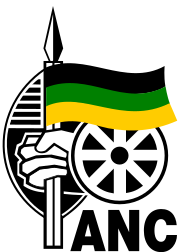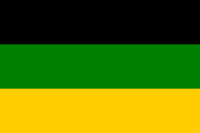South African Native National Congress
|
African National Congress (ANC)
|
|
|---|---|
 |
|
| Abbreviation | ANC |
| President | Cyril Ramaphosa |
| Chairperson | Gwede Mantashe |
| Secretary-General | Ace Magashule |
| Spokesperson | Pule Mabe |
| Deputy President | David Mabuza |
| Deputy Secretary General | Jessie Duarte |
| Treasurer General | Paul Mashatile |
| Founders |
John Langalibalele Dube Pixley ka Isaka Seme Sol Plaatje |
| Founded | 8 January 1912 |
| Legalised | 3 February 1990 |
| Headquarters |
Luthuli House 54 Sauer Street Johannesburg |
| Newspaper | ANC Today |
| Youth wing | ANC Youth League |
| Women's wing | ANC Women's League |
| Veteran's League | ANC Veterans League |
| Paramilitary wing | Umkhonto we Sizwe (integrated into SANDF) |
| Membership (2015) | 769,000 |
| Ideology |
African nationalism Social democracy |
| Political position | Centre-left |
| National affiliation | Tripartite Alliance |
| International affiliation | Socialist International |
| African affiliation | Former Liberation Movements of SA |
| Colours | Black, green, gold |
| Slogan | South Africa's National Liberation Movement |
| Anthem | “Nkosi Sikelel' iAfrika” |
| National Assembly seats |
249 / 400
|
| NCOP seats |
60 / 90
|
| NCOP delegations |
8 / 9
|
| Pan-African Parliament |
3 / 5
|
| Party flag | |
 |
|
| Website | |
| www |
|
The African National Congress (ANC) is the Republic of South Africa's governing political party. It has been the ruling party of post-apartheid South Africa on the national level, beginning with the election of Nelson Mandela in the 1994 election. Today, the ANC remains the dominant political party in South Africa, winning every election since 1994. Jacob Zuma, the incumbent head of state and ANC leader since 2007, was replaced as the ANC's chief by South Africa's deputy president Cyril Ramaphosa on 18 December 2017.
Founded on 8 January 1912 by John Langalibalele Dube in Bloemfontein as the South African Native National Congress, its primary mission was to give voting rights to black and mixed race Africans and, from the 1940s, to end Apartheid. The ANC originally attempted to use nonviolent protests to end apartheid, however, the Sharpeville massacre resulted in the deaths of 69 black Africans and contributed to deteriorating relations with the South African government. On 8 April 1960, the administration of Charles Robberts Swart, banned the ANC and forced the party to leave South Africa. After the ban, the ANC formed the Umkhonto we Sizwe (Spear of the Nation) to fight against apartheid utilizing guerrilla warfare and sabotage. On 3 February 1990, State President F. W. de Klerk lifted the ban on the ANC and released Nelson Mandela on 11 February 1990. On 17 March 1992, the apartheid referendum was passed by the voters removing apartheid and allowing the ANC to run in the 1994 election. Since the 1994 election the ANC has performed better than 60% in all general elections, including the most recent 2014 election.
...
Wikipedia
